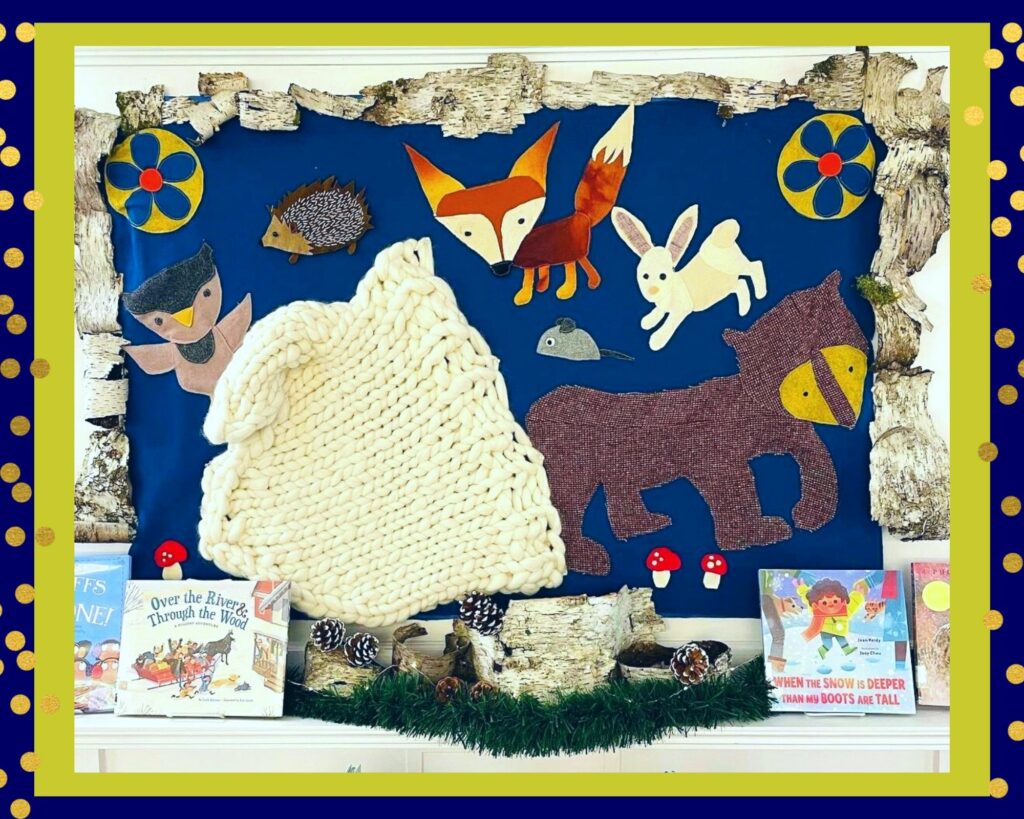
Aprill celebrates The Mitten’s winter coziness with a wonderful display at Burbank.
Welcome, readers! If you would like nothing more than to curl up in a giant warm mitten with a stack of books for the rest of the winter, read on! Our staff shares a heap of reading ideas and resources for you to ponder.
And most of all, thanks so much for stopping by the Main Library, Peaks, Riverton, Burbank and the Bookmobile in 2021. We’ve loved seeing you this year and look forward to 2022 at the library.
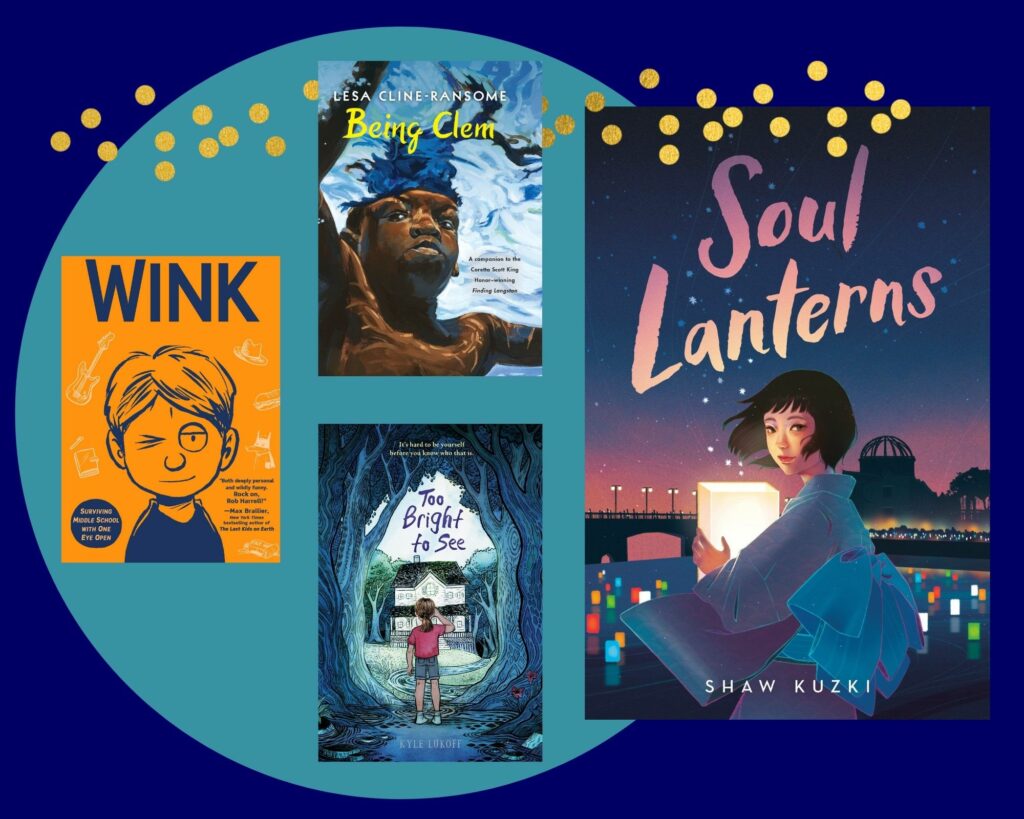
Vicky’s Picks
If you’re a kid, one of the most awesome things about December is that here in Maine there’s a week off from school at the end of it, and what’s better to do during a cold winter week than read? Here are some great books for middle-grade readers looking to while away some time with one…or two…or three….
Being Clem, by Lesa Cline-Ransome. The final volume in the author’s “Finding Langston” trilogy about Black boys in World War II–era Chicago, this outing follows Clem as he grapples with the loss of his father in the Port Chicago Disaster, with living under the thumbs of older sisters with big personalities, with his fear of water. He wants to be a Navy man like his dad; how can he do that if he can’t swim?
Soul Lanterns, by Shaw Kuzki and translated by Emily Balistrieri. In Hiroshima, every August 6 the people float lanterns down the river to remember loved ones lost in “the Flash.” Twenty-five years after the bombing, 12-year-old Nozomi starts to wonder about the lanterns her family releases, a question that turns into a heartbreaking and heart-mending journey for the wounded city and its children.
Too Bright to See, by Kyle Lukoff. Bug, an 11-year-old white Vermonter, is getting ready to start middle school. That would be hard enough on its own, but doing it without Uncle Roderick, who’s just passed away, makes it extra tough. Then there’s the ghost, who seems to be trying to tell Bug something. Could it be Uncle Roderick? Uncle Roderick was gay, but maybe he was also transgender…or maybe Bug is?
Cindy’s Pick
“I’m lying on a steel table, all too aware of the giant ray gun pointed in my direction. It looks like one of those room-sized five-ton laser things supervillains use in movies. The kind they threaten to destroy the planet with.”
My favorite middle grade book of 2021 was Wink: A Novel by Rob Harrell. I listened to it using the wonderful cloudLibrary app, but I’ve also thoroughly perused all the illustrations in our print copy of the book because they’re important: Ross is a budding artist. In the book Ross (a seventh grader) has a rare form of eye cancer called Lacrimal cancer, which is cancer of the tear duct, and the story begins with his first radiation treatment. But Wink is about so much more than his cancer. It’s a story about best friends and new friends and dealing with bullies and cyber-bullying in particular. Someone is making terrible memes about Ross, so part of the novel is figuring out who the culprit is. It was touching, sweet, often laugh-out-loud funny, and shocking all at once. I highly recommend this book and wish that I could un-read it so I could read it all over again for the first time!
Becca’s Pick
Early 2021 was a dark time, and the distractions were no longer working. Our kitchens had an extra bag of flour. Our closets had new hiking boots that were on the verge of being properly broken in. Our bedside tables were full of bookmarked fantasy series, apocalypse novels, Russian tomes, and the same picture books read aloud again, again, again. We shopped for groceries while worrying about sick loved ones. We tried to shove our hardened hearts into the Play-Doh mold of Normal Life Activities. We were exhausted, depressed, anxious, and alone.
In May, six of us gathered in Congress Square Park for our first Blurb Club, our new informal book club where attendees can talk about any book. We sat in an appropriately distanced circle with masks over our mouths. While isolation made us trepidatious and awkward, there was also palpable relief behind doing the thing, that thing we couldn’t do for so long – gathering with other humans in a physical space!
Almost every week, I experience the phenomenon of meeting someone at their first in-person outing with other non-familial humans since March 2020. Some people come with a pile of books they devoured in isolation, while others arrive with nothing. One small social gathering on a calendar is a gift I feel honored to help bring to the park every other Thursday. Now, as we pack it in for the winter and move over to Mechanics’ Hall, early 2022 feels a little less daunting.
Scandalously, I don’t love Blurb Club because of the books. I love it for the basest of reasons: the warm buzz of being surrounded by others, listening to the soothing sound of real people talking and laughing. I hope you can join our cozy circle in 2022.
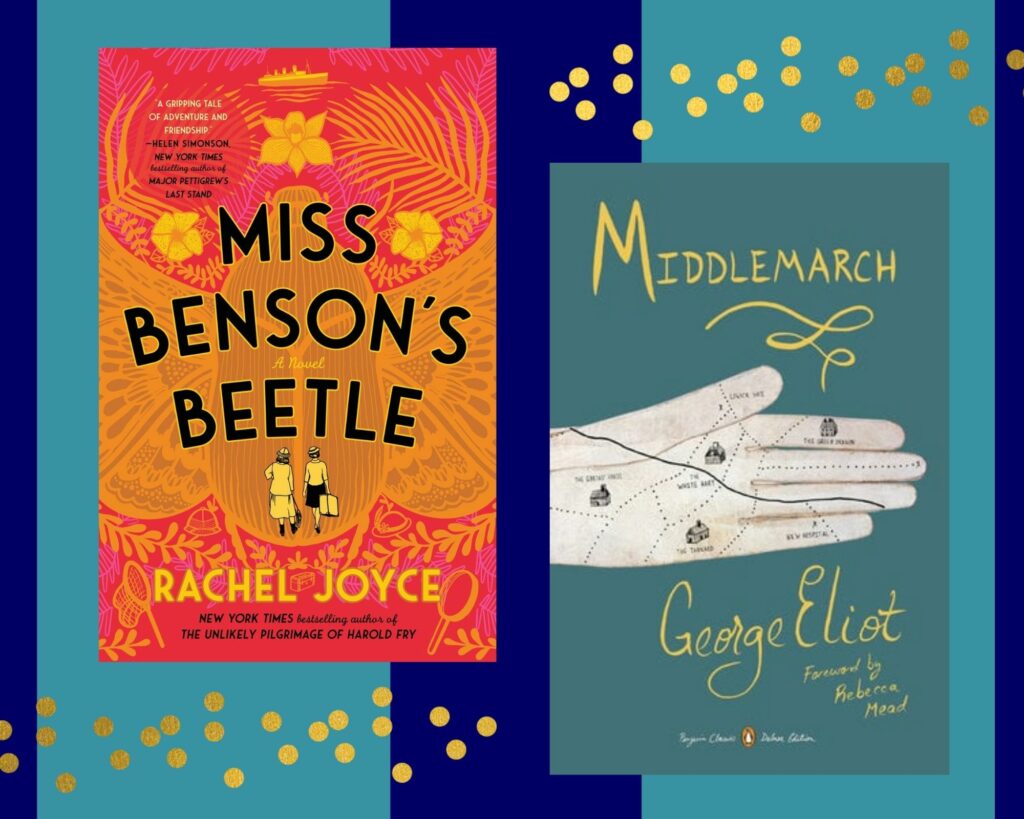
Stephanie’s Picks
My December picks are favorites for different reasons. For example, Jessica Anthony’s Enter the Aardvark was original, hilarious, and an enjoyable satire. The Searcher by Tana French has wonderful Irish prose and characters wrapped around a strong plot. Miss Benson’s Beetle by Rachel Joyce offered very adventurous women. Julia Claiborne’s Better Luck Next Time is set in Reno where I grew up. (Divorce ranches were still around long after the novel’s 1938 setting). Richard Osman’s The Thursday Murder Cluband The Man Who Died Twice celebrate believable seniors who are kind and funny and clever enough to solve some difficult murders.
Zoë‘s Pick
My December pick is Middlemarch by George Eliot. I started reading this classic (nearly 900 pages) in October thinking I would finish it in, yes, in middle March 2022. But no! It is now the end of November (as I write this) and I am bereft after finishing it. The writing is dazzling, the characters hilarious, the entire read a charm-and-a-half. Something about the “adultness” of it is just wonderful…people and their misbegotten loves, foibles, their human-ness all drawn to perfection.
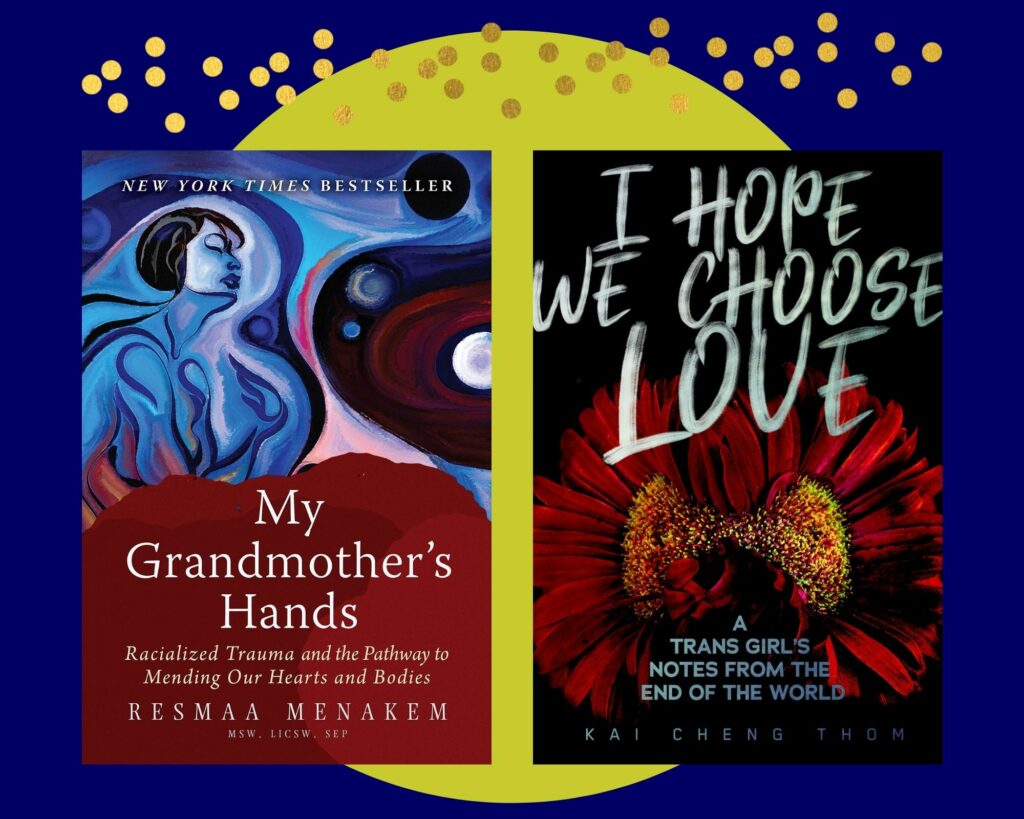
Ann’s Picks
One of my favorite resources from this year is Kai Cheng Thom’s So You’re Ready to Choose Love. This free online workbook digs into the themes of Thom’s I Hope We Choose Love, giving us tools to grow as we navigate conflict and harm. Another resource I’m just getting into as this year draws to a close is Resmaa Menakem’s My Grandmother’s Hands: Racialized Trauma and the Pathway to Mending Our Hearts and Bodies. Menakem’s book includes exercises for grounding while exploring white supremacy’s traumatic impact on bodies, and I look forward to reading and reflecting on his work in the new year.
Hannah’s Pick
Robin Marty’s New Handbook for a Post-Roe America is an essential resource for any household—as legal and practical barriers to reproductive healthcare proliferate, U.S. statistics are such that each and every one of us knows (and probably loves) someone who will, at some point in their lifetime, need help accessing said care.
Regardless of the inevitable legislative or judicial sea changes coming our way, our bodies and our families will remain our own—unpredictable, ungovernable, and connected to communities of support. Information about those communities, and about the many other resources and tools that will be needed for American families to survive and thrive in the coming years, is crucial. And Marty situates her reader on the map of science, medicine, policy, and direct care in a way that is digestible, galvanizing, and full of heart.
I’ve taken notes from nearly every page!
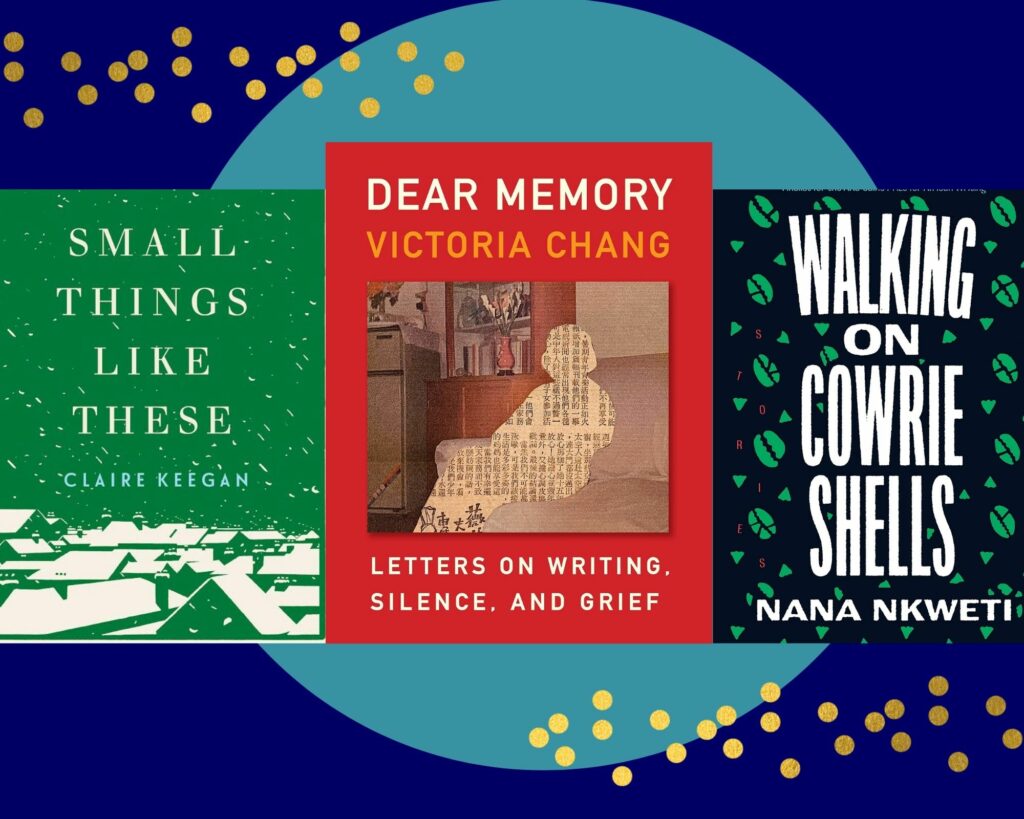
Elizabeth’s Picks
The truth is I loved dozens of books this year, of all kinds—fantasy, memoir, nature writing, poetry—books like The Thirty Names of Night, Land of Big Numbers, The Space Between Worlds, The Watchmaker of Filigree Street, The Fox’s Tower and Other Tales, We Have Always Been Here, Walking on Cowrie Shells, The Carrying, and Field Study.
Two luminous books have stuck with me—the language, humor, and beauty of Leanne Betasamosake Simpson’s Noopiming, and the incredible look at people, place, and the sea in Lamorna Ash’s Dark, Salt, Clear: The Story of a Fishing Town. A story I keep thinking of is “The Kite Maker” in Brenda Peynado’s wonderful collection The Rock Eaters. On the surface it’s a tale about a kite maker and her encounters with an alien who loves to fly kites, and in the depths it’s about much more. A sci-fi classic.
Honorée Fanonne Jeffers’ The Love Songs of W.E.B. Dubois was a tome I curled up with for days that went by in a flash, its family story dipping between the past and present. A powerful short novel I just read this week is Claire Keegan’s Small Things Like These. It’s alyrical, heartfelt tale of an Irish man in 1985 who—in the midst of Christmas—stumbles across the terrible truth of the Magdalene Laundries and wonders what to do:
“He found himself asking was there any point in being alive without helping one another?”
Victoria Chang’sDear Memoryis a new book I’m still poring through—her prose poems shine. “We often say night falls,” she writes. “I think the night rises. I think the bright falls.” I’m reading it thinking of Camille Dungy and her recent writingon how many are needing the space to grieve right now, and how a poem can offer that place for grief and feeling.
This summer, I found a welcome solace in Poetry as An Art of Survival with Portland Poet Laureate Maya Williams and Poetry Unbound host Pádraig Ó Tuama. I’m so looking forward to Maya’s writing workshops with PPL in 2022, kicking off on January 8! Ey and Myri U. will focus on poetry and self-care.
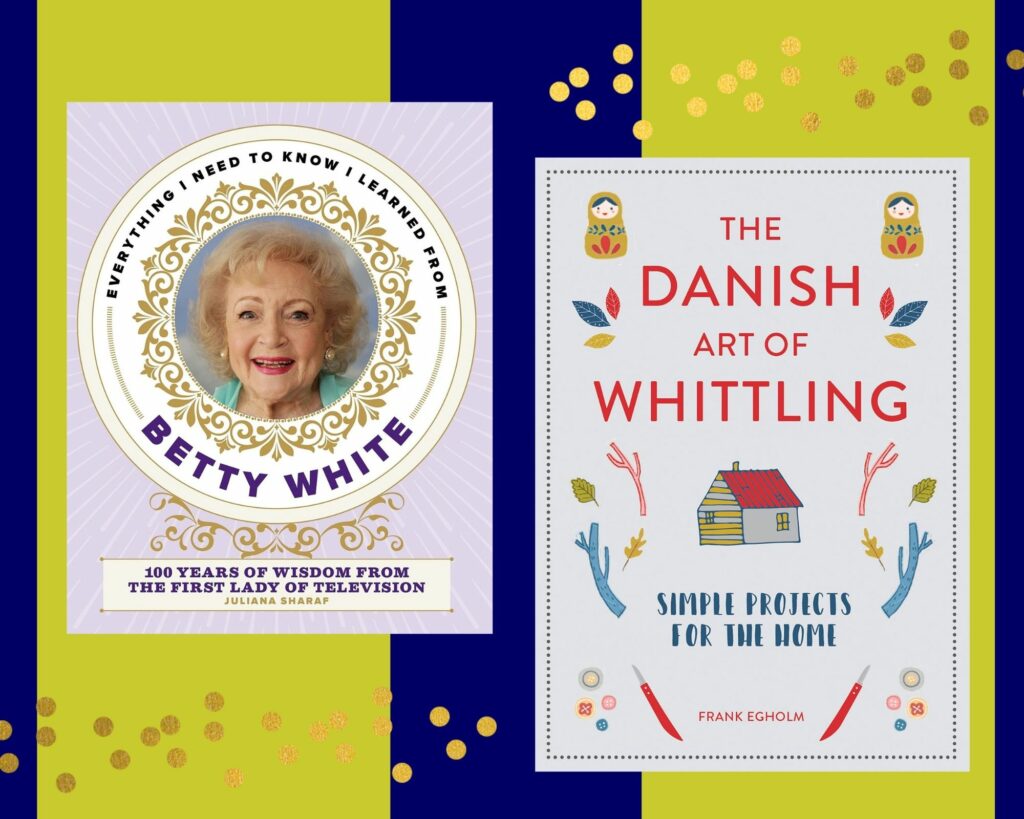
Sarah S’ Pick
I’m focusing on joy and light this month, and I think Everything I Need to Know I Learned From Betty White will match that spirit. I’m looking forward to learning more about the spunk and grit behind this beloved legend…who will turn 100 in January!
Eileen’s Pick
“When whittling, your mantra should be: ‘Always cut away from yourself.’”
Sound advice whether whittling or not, I’d say.
It is likely that the very last thing I need is a hobby that will litter the house with wood shavings and require me to grasp a sharp implement in my dilettante’s grip, but that isn’t stopping me from thinking maybe I could learn something from Frank Egholm’s book The Danish Art of Whittling: Simple Projects for the Home. It is geared for rank beginners and amply seasoned with photos of Danish children crafting toys in pastoral settings. Worth noting: not one of the children is bleeding. You can practically feel the thin Scandinavian sunshine feeding hope that your forked branch could be transformed into a rustic bird-shaped whistle, too, with some concentration, a well-applied whittling knife and Frank Egholm’s wise tutelage.
In closing, I ask this unrelated question: have you seen the movie Waking Ned Devine? I find it impossible to feel bad while anticipating watching it, actually watching it, or recollecting watching it. I do not make this claim lightly. In fact, why am I not watching it right this instant?
My Year’s End wish for you is that you make time for a movie, or music, or a book that you know makes you happy.
I think that’s pretty good advice, too.
As ever, thanks for reading! You can find all the books discussed or pictured here compiled in one list: The Mitten: December Staff Picks.
If you are looking for more reading ideas for kids, teens, and adults, that is our very favorite thing. Try our Your Next (Great!) Read service to get a personalized list of books just for you (or a reader you know).